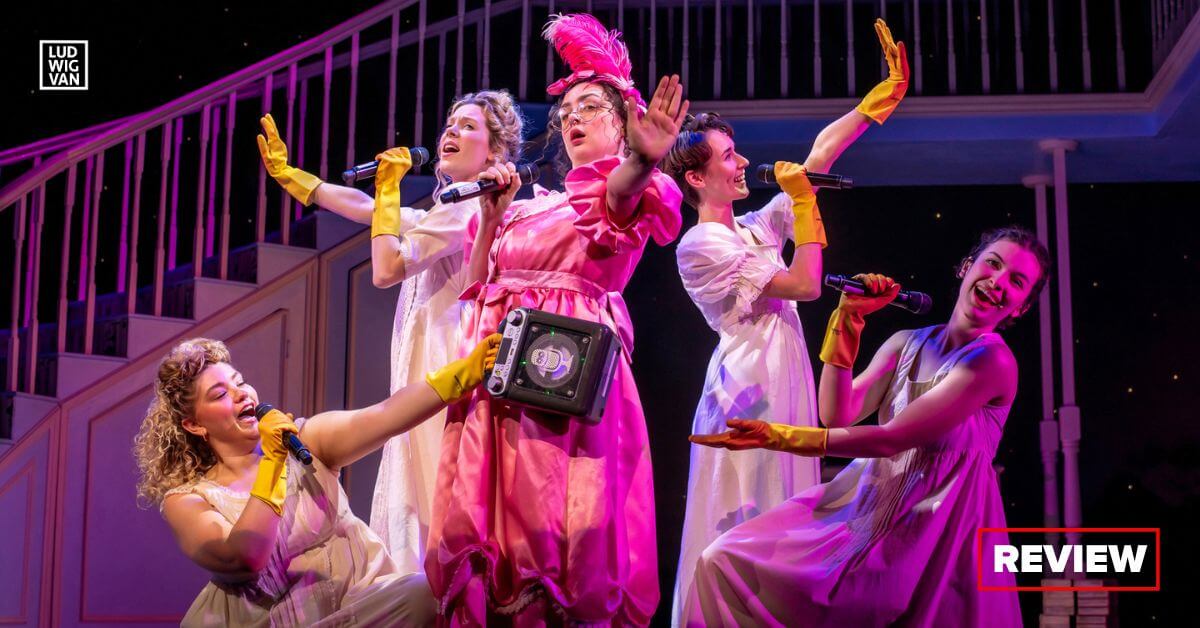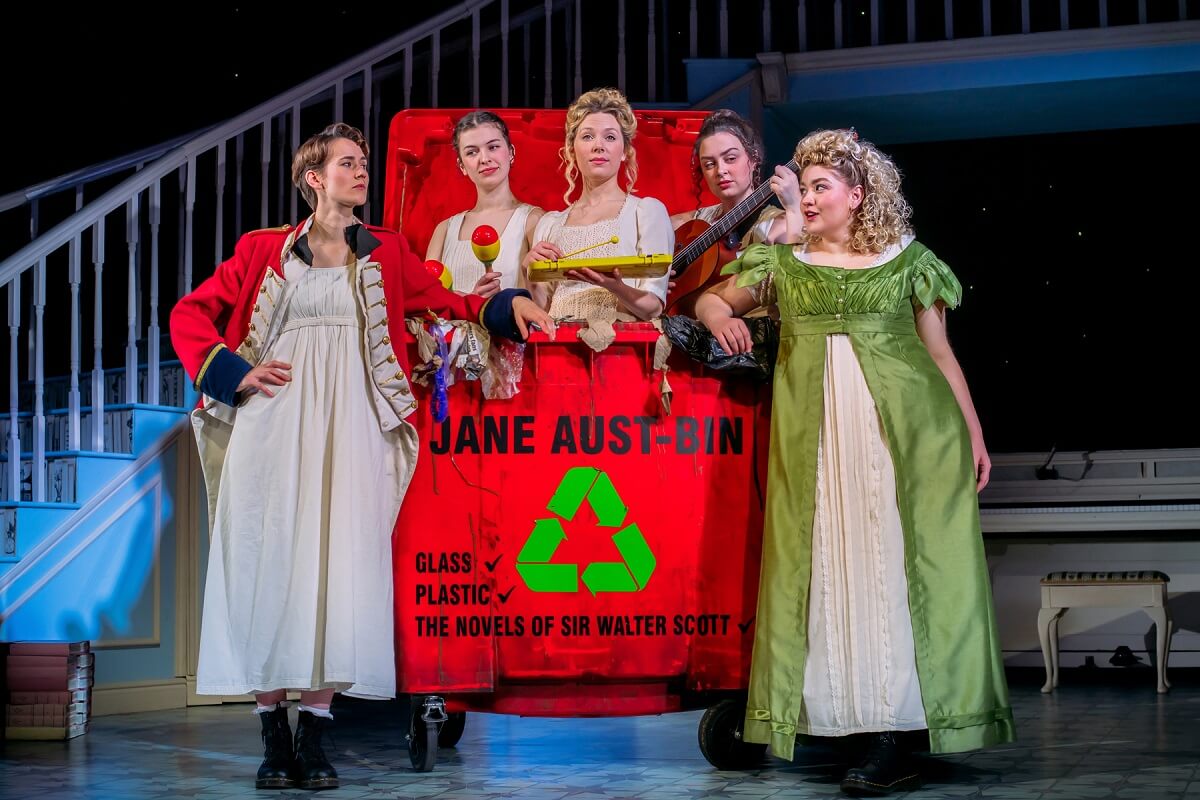
David Mirvish/Pride & Prejudice* (*Sort Of), by Isobel McArthur (after Jane Austen), co-directed by Isobel McArthur and Simon Harvey, CAA Theatre, to Jan. 21. Tickets here.
There is nothing like a dose of silliness to wash away the blues, and Pride & Prejudice* (*Sort Of) is that kind of show. For two and a half hours, you can forget about the terrible world situation and the climate crisis while you let yourself be swept up in laughter.
The silliness I’m talking about here is clever silliness, in other words, substance beneath the shenanigans. P&P*SO is Scottish playwright Isobel McArthur’s eccentric riff on Jane Austen’s beloved 1813 novel, one of the earliest and most famous of the Rom-Com genre. In fact, by the time this 2018 show migrated from Glasgow’s Tron Theatre to London’s West End in 2021, it had garnered rave reviews in the provinces. Not surprisingly, P&P*SO won the coveted Olivier Award for Best Comedy.
The Plot
It is a truth universally acknowledged that Austen’s Pride and Prejudice has become something of a cottage industry. There are countless film and TV versions of the original, not to mention prequels and sequels, updated storylines, and treatments that feature zombies and Bollywood. There is even a novel called The Independence of Miss Mary Bennett by Colleen McCullough, she who wrote the towering bestseller, The Thorn Birds.
McArthur’s take on Austen is to tell the story of P&P from the viewpoint of the servants who finally get their hour in the sun, while reminding us, sadly, that Austen paid them little attention. After all, they tell us, love and courtship wouldn’t be happening without them carrying letters back and forth, or relaying gossip. In fact, they also assert, without the loyal servants, the households, in which they serve, would undoubtedly collapse.
Now oddly enough, McArthur is not the first to focus on the servants. British writer Jo Baker, in her acclaimed 2013 novel Longbourn, picked out the few named and unnamed servants in P&P, and wrote an entire novel about their lives in relation to the Bennett family. But, while Baker’s take on P&P is serious literature, McArthur goes for the funny bone. It is, however, important to point out, that despite the humour, she is very faithful to Austen’s storyline. The major highs and lows of P&P, are all there in P&P*SO.
Language, Themes and Devices
As an added bit of genius, there is music in P&P*SO, but it is rendered as karaoke. The action stops as microphones and a mini boom box appear out of nowhere, and the five ladies of the cast burst into song. These musical inserts, mostly pop favourites from the 60s and 70s, are screamingly funny and brilliantly apt. For example, as Jane heads off to Netherfield when the long awaited invitation finally arrives, she croons “At Last”, but the best has to be Elizabeth deflating Mr. Darcy with “You’re So Vain”.
There is also a very strong feminist message underling P&P*SO. As the servants remind us, women in Regency England could not inherit property. In the case of the Bennett sisters, unless they married, they would be destitute, once their father’s estate passed to a male heir. This accounts for Mrs. Bennett’s desperate fixation on getting her five daughters married, and in P&P*SO, she drinks a lot while devouring Quality Street candies.
Speaking of Quality Street candies, there are many contemporary references in the show. For example, the first time we see Charles Bingley, he has his arm stuck in a Pringles tube. There are also inside jokes for rabid Austen aficionados. At one point a recycling bin is brought on stage — an Aust-Bin — and among the list of things you can put in it, are the novels of Sir Walter Scott. Apparently, my research tells me, that while Scott liked her writing, Austen did not return the compliment.
Humour in the text is one thing, (and there are some great lines, such as Mr. Darcy’s “You know what I hate? People!”, or Lydia’s “I just love balls!”), but words, however, can be enriched by physical comedy. Adding to the merriment of P&P*SO is the comedy staging of Lecoq trained guru Jos Houben, and the fact that he gets pride of place among the credits demonstrates just how important his role was, alongside the co-directors, for pulling the show together. Willy the Horse has to be seen to be believed.
Be warned, this is a swearing and smutty show. There is a lot of low poop humour, while the blue language is surprising, but perfectly apt. For example, exasperated by Elizabeth’s high-handed manner regarding marriage, Mrs. Bennett barks at her to stop “being a fucking smartarse”. And then there is Elizabeth’s reply to Mr. Collins’ marriage proposal. In the novel, she has to turn him down in language that is within the confines of polite society. In P&P*SO, she dismisses him out of hand with a hilarious, “Fuck off!”
In her program notes, McArthur says she was influenced, in part, by the Glasgow music hall tradition, and that is evident in the salty language and the inane sight gags.

Cast and Creative
There is not a weak link in the cast. Apparently, McArthur and co-director Simon Harvey wanted a mishmash of British accents, and that’s what we get, although it would mean more to an audience over the pond than it would to us. After all, Austen’s novel is about money and class, and the various accents, none of them posh, would bring that home.
The five amazing women of P&P*SO have to negotiate multi-roles which means lightning-fast costume changes, and kudos to designer Ana Inés Jabares-Pita for making that possible. The women begin in white petticoat undergarments and Doc Martens, to which they overlay the regency clothing. The multi-talented women also play a number of instruments throughout including piano, guitar, saxophone and accordion.
The novel’s characters are divided up among the actors in an interesting manner. I should point out that missing from the cast is Kitty Bennett, the second youngest daughter, but in as much as she followed Lydia’s lead, she would be a duplication.
Ruth Brotherton is the only actor with a single persona, namely Elizabeth Bennett, she being the novel’s heroine. Her Lizzie is forthright, cheeky, insightful, sarcastic and full of confidence. Austen would have been proud.
Christina Gordon swings delightfully from sweet Jane Bennett to swaggering George Wickham, to the imperious ogre, Lady Catherine de Bourgh. Lucy Gray has great fun being both the nice Charles Bingley and his bitchy sister Caroline, as well as the love-torn Charlotte Lucas, she being the lesbian interest, (McArthur’s invention), in her unrequited love for Elizabeth. Gray also portrays the Bennett’s maid Tillie.
Dannie Harris gets the best acting job with the stiff and stand-offish Mr. Darcy, and the rattled and ditsy Mrs. Bennett. The funniest by far is Leah Jamieson who gets to overact with gusto depicting the sex-driven Lydia Bennett, the hapless Mary Bennett, and the greatest nerd of them all, Mr. Collins. Jamieson finds some sort of normalcy with the Bennett’s aunt, Mrs. Gardiner. As for Mr. Bennett, his portrayal is another of P&P*SO’s delightful surprises.
Jabares-Pita has given the cast a set that comprises a giant sweeping staircase, under which are panels that become exits and entrances. The cast brings in set pieces, like Mrs. Bennett’s settee, when needed. This simple structure works well because it can stand for all the places in the novel, be they Longbourn, Netherfield Park, Pemberley or Rosings.
Final Thoughts
Broad satire though it is, Pride & Prejudice* (*Sort Of) encompasses everything that is important about Austen’s original novel. Even if you haven’t read the book, the story is easy to follow because the characters are so well-developed, while the karaoke numbers are the icing on the cake.
In other words, this fun-filled show is a can’t miss, both for Austen fans and Austen virgins alike.
Are you looking to promote an event? Have a news tip? Need to know the best events happening this weekend? Send us a note.
#LUDWIGVAN
Get the daily arts news straight to your inbox.
Sign up for the Ludwig Van Toronto e-Blast! — local classical music and opera news straight to your inbox HERE.
- INTERVIEW | Actor Diego Matamoros Takes On Icon Walt Disney In Soulpepper Production Of Hnath Play - April 16, 2024
- SCRUTINY | Opera In Concert Shine A Light On Verdi’s Seldom Heard La Battaglia Di Legnano - April 9, 2024
- SCRUTINY | Lepage & Côté’s Hamlet Dazzles With Dance And Stagecraft Without Saying Anything New - April 5, 2024



